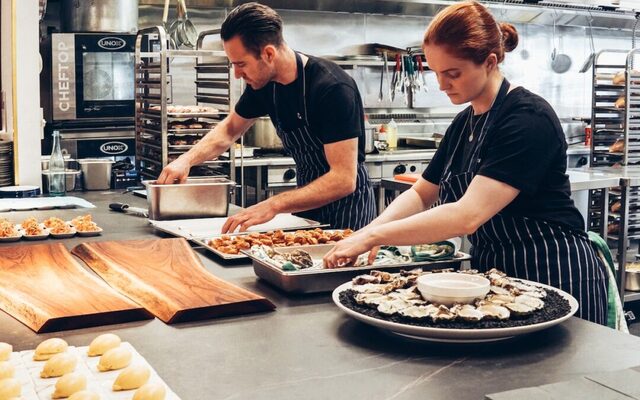Cooking isn’t just about creating meals—it’s an opportunity to turn your passion into profit. Whether you’re a seasoned chef or just starting, the food industry is full of potential for those who know how to bring flavors to life.
In South Africa, where the food culture is as diverse as its people, cooking can be the gateway to a successful business. From street food to catering, there are endless ways to tap into the demand for tasty, unique dishes.
If you’ve ever dreamed of turning your love for cooking into a profitable venture, now is the perfect time to dive in. Keep reading to discover how you can transform your kitchen skills into a thriving business.
The Rise of Food Entrepreneurship in South Africa
South Africa is a country with a rich cultural diversity, which is reflected in its cuisine. From traditional dishes like bobotie and bunny chow to street food such as vetkoek and biltong, South African cuisine offers a wide array of flavors that appeal to both locals and tourists alike.
The popularity of food businesses is on the rise, driven by the country’s strong food culture and an ever-growing demand for new culinary experiences.
The demand for quality food is only increasing, with consumers seeking both traditional and innovative flavors. Entrepreneurs have the opportunity to capitalize on this demand by offering unique, flavorful dishes that capture the essence of South Africa’s food culture.
Discovering Profitable Cooking Niches
Cooking offers a vast range of possibilities when it comes to finding your niche. Whether you want to create a full-fledged restaurant or simply sell food at local markets, there’s something for everyone. Here are some of the profitable niches in South Africa’s food scene:
-
Street Food
South Africans love their street food, and for good reason. Dishes like bunny chow, boerewors rolls, and shisa nyama are beloved nationwide. Starting a street food business can be relatively inexpensive, and the demand for quick, flavorful meals is high. With the right location and a good marketing strategy, a street food business can quickly become a profitable venture. -
Catering Services
The catering industry in South Africa is thriving. From corporate events to weddings and private parties, there’s a growing need for professional catering services. Specializing in a niche—such as gourmet catering, traditional African food, or fusion cuisine—can help you stand out and attract a loyal customer base. Offering unique cooking experiences, such as cooking classes or private chef services, can also be a lucrative addition to your catering business. -
Health-Conscious Cooking
With increasing awareness around health and wellness, many South Africans are turning to healthier eating options. If you’re skilled in cooking nutritious, plant-based, or low-carb meals, there’s a market for your services. You can tap into the demand for clean eating by offering meal prep services or starting a food delivery business that caters to health-conscious customers. -
Bakery Business
The bakery business is another thriving niche in South Africa. Whether you specialize in traditional South African baked goods like milk tart and rusks or modern cakes and pastries, a bakery can be a profitable venture. People love baked goods for breakfast, dessert, or as snacks, and if your offerings are delicious and unique, you can attract a steady stream of customers. -
Online Cooking Classes and Recipe Books
If you’re not interested in opening a physical business, online cooking courses and digital recipe books are another avenue to explore. There’s a growing market for online education, and many South Africans are keen to improve their culinary skills from the comfort of their own homes. Offering paid courses or publishing a recipe book that highlights South African flavors can be an effective way to monetize your cooking expertise.
The Importance of Flavor and Quality
One of the key aspects of a successful cooking business is delivering dishes that stand out in terms of flavor and quality. South Africans value bold, authentic flavors, and if your food is tasty, you will gain loyal customers.
The use of fresh, local ingredients is essential, as it not only supports local farmers but also ensures the best possible taste.
Experimenting with flavors and incorporating traditional African ingredients into your dishes can also give you an edge. For example, you could experiment with using indigenous plants like moringa or baobab in your recipes, or you could focus on mastering the perfect seasoning for a classic bobotie.
By paying attention to the details and ensuring that your food is flavorful and high-quality, you’ll build a solid reputation and increase your chances of success.
Branding and Marketing Your Cooking Business
Once you’ve honed your cooking skills and have decided on your business model, the next step is branding and marketing. In South Africa, social media plays a significant role in the success of food businesses.
Platforms like Instagram and Facebook are perfect for showcasing your dishes, sharing behind-the-scenes content, and building a community of food lovers.
You can also leverage local food influencers or bloggers to help promote your business. Word-of-mouth marketing is still incredibly powerful, and if people love your food, they’ll share it with their networks.
Additionally, having a website with an online ordering system or booking service for your catering can increase your visibility and accessibility.
Overcoming Challenges in the Cooking Business
As with any business, there are challenges to overcome in the cooking industry. South Africa’s economic environment presents hurdles, such as fluctuating food prices and competition. However, with careful planning and a passion for food, these challenges can be managed.
It’s also crucial to keep up with food trends and adapt your offerings to meet changing consumer preferences. As dietary needs evolve, offering more diverse menu options, such as vegan, gluten-free, or keto-friendly dishes, can help you cater to a broader audience.
Another challenge is maintaining consistent quality and service. In the cooking business, word of mouth is everything. Delivering a consistently great product and providing excellent customer service will keep customers coming back and recommending your business to others.
Profitability and Growth
Starting a cooking business requires investment, but it can also offer substantial profits. The key to profitability lies in efficient cost management, high-quality ingredients, and effective marketing.
As your business grows, you can expand by offering more services, opening additional locations, or even franchising your food concept.
Once you’ve established a customer base, you can explore additional revenue streams, such as selling branded sauces, spices, or baked goods. Diversifying your offerings can help you tap into new markets and increase your profits over time.
Conclusion: Cooking Up Success in South Africa
The potential for turning cooking into a profitable business in South Africa is immense. Whether you’re selling food on the streets, offering catering services, or teaching others how to cook, there are numerous opportunities to profit from your passion for food.
By focusing on quality, leveraging local ingredients, and building a strong brand, you can turn your culinary expertise into a successful business that fills both plates and wallets.
The South African food scene is vibrant, diverse, and full of possibilities, and with the right approach, you can carve out a niche and build a profitable cooking venture that stands the test of time.





